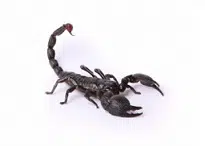The notion of poison refers to a substance that, due to its properties, is harmful to health or even lethal . Venom is generally associated with poison .
However, we cannot ignore that other words that can function as synonyms for poison are toxic and cough.
 A poisonous or poisonous animal , in this framework, is one that has poison or venom. These are living beings that have glands to produce toxins and stingers, fangs or other structures to transfer them.
A poisonous or poisonous animal , in this framework, is one that has poison or venom. These are living beings that have glands to produce toxins and stingers, fangs or other structures to transfer them.
These animals usually transmit the poison when they try to catch prey or to defend themselves from a threat. Poisoning can also be caused accidentally. Various types of spiders and snakes are among the poisonous species.
Bees, wasps or fish such as the stingray can also be considered poisonous animals. And among those, there is also the scorpion, for example. This animal is part of the order of arthropods and is characterized by the fact that its tail has a stinger that has poison. This poison will affect the nervous system of the person who is stung by the aforementioned scorpion.
However, it must be taken into account that said human being, after being a victim of that animal, can suffer both heart failure and respiratory failure.
The term, on the other hand, is used with reference to an action or attitude that causes moral damage . Poison is linked to evil and even cruelty .
Suppose that, on a television program, an actor argues with a film director. In the midst of the altercation, the filmmaker reminds the actor of various failures in which he was involved and even mentions his addictions, a health problem that had never been revealed. Due to these statements, especially the revelation about the illness, journalists then highlight the director's venom.
Let's look at an example taken from reality. At the end of 2018, Pau Donès , leader of the band Jarabe de Palo , described reggaetón as "poison" . The Spaniard used the concept to highlight that, in his opinion, reggaeton has no message and is "mediocre music." The poison, in this case, would be caused by the transmission of something negative.
In the same way, we cannot ignore the existence of several cultural works that have the term that concerns us now in their title. A good example of this is the book «Ponzoña en los ojos. Witchcraft and superstition in Aragon in the 16th century.
This is a work carried out by Maria Tausiet that is presented as the first study of witchcraft in the region of Aragon in the aforementioned period, which is when the largest "witch hunt" in history was carried out in Europe.
Likewise, it exposes the three types of authorities that existed at that time to go against witchcraft and that carried out the trials and sentences of those accused of practicing it. Specifically, we talk about episcopal justice, the justice of the Inquisition and secular justice.
